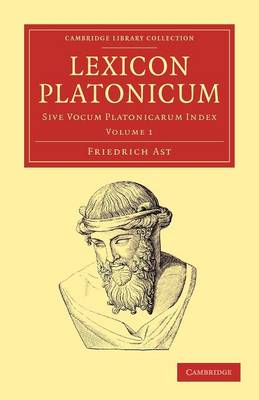Cambridge Library Collection - Classics
2 primary works • 5 total works
Volume 1
The German philosopher and philologist Friedrich Ast (1778–1841) published this monumental lexicon in three volumes (1835–8). A professor of classical literature at the University of Landshut and member of the Bavarian Academy of Sciences, Ast wrote widely on the history of philosophy. He edited a complete edition of Plato with Latin translation, identifying spurious interpolations and false attributions, using this as a basis for his Lexicon. The work is arranged alphabetically, Volume 1 (1835) covering Alpha to Epsilon. The entries give citations both from Plato and from later works that extensively quote Plato. Though the Lexicon met with criticism for omissions of particles, prepositions and proper names, and the lack of systematic arrangement, it had a high reputation throughout the nineteenth century. It remains a milestone of Plato scholarship and is an indispensable resource for readers interested in the history of philology and methods in textual criticism.
Volume 2
The German philosopher and philologist Friedrich Ast (1778-1841) published this monumental lexicon in three volumes (1835-8). A professor of classical literature at the University of Landshut and member of the Bavarian Academy of Sciences, Ast wrote widely on the history of philosophy. He edited a complete edition of Plato with Latin translation, identifying spurious interpolations and false attributions, using this as a basis for his Lexicon. The work is arranged alphabetically, Volume 2 (1836) covering Theta to Omicron. The entries give citations both from Plato and from later works that extensively quote Plato. Though the Lexicon met with criticism for omissions of particles, prepositions and proper names, and the lack of systematic arrangement, it had a high reputation throughout the nineteenth century. It remains a milestone in Plato scholarship and is an indispensable resource for readers interested in the history of philology and methods in textual criticism.
The German philosopher and philologist Friedrich Ast (1778-1841) published this monumental lexicon in three volumes (1835-8). A professor of classical literature at the University of Landshut and member of the Bavarian Academy of Sciences, Ast wrote widely on the history of philosophy. He edited a complete edition of Plato with Latin translation, identifying spurious interpolations and false attributions, using this as a basis for his Lexicon. The work is arranged alphabetically, Volume 3 (1838) covering Pi to Omega. The entries give citations both from Plato and from later works that extensively quote Plato. Though the Lexicon met with criticism for omissions of particles, prepositions and proper names, and the lack of systematic arrangement, it had a high reputation throughout the nineteenth century. It remains a milestone in Plato scholarship and is an indispensable resource for readers interested in the history of philology and methods in textual criticism.
The German philosopher and philologist Friedrich Ast (1778-1841) published this monumental lexicon in three volumes (1835-8). A professor of classical literature at the University of Landshut and member of the Bavarian Academy of Sciences, Ast wrote widely on the history of philosophy. He edited a complete edition of Plato with Latin translation, identifying spurious interpolations and false attributions, using this as a basis for his Lexicon. The entries give citations both from Plato and from later works that extensively quote Plato. Though the Lexicon met with criticism for omissions of particles, prepositions and proper names, and the lack of systematic arrangement, it had a high reputation throughout the nineteenth century. It remains a milestone in Plato scholarship and is an indispensable resource for readers interested in the history of philology and methods in textual criticism.
The German philosopher and philologist Friedrich Ast (1778-1841) published this monumental lexicon in three volumes (1835-8). A professor of classical literature at the University of Landshut and member of the Bavarian Academy of Sciences, Ast wrote widely on the history of philosophy. He edited a complete edition of Plato with Latin translation, identifying spurious interpolations and false attributions, using this as a basis for his Lexicon. The work is arranged alphabetically, Volume 1 (1835) covering Alpha to Epsilon. The entries give citations both from Plato and from later works that extensively quote Plato. Though the Lexicon met with criticism for omissions of particles, prepositions and proper names, and the lack of systematic arrangement, it had a high reputation throughout the nineteenth century. It remains a milestone of Plato scholarship and is an indispensable resource for readers interested in the history of philology and methods in textual criticism.

